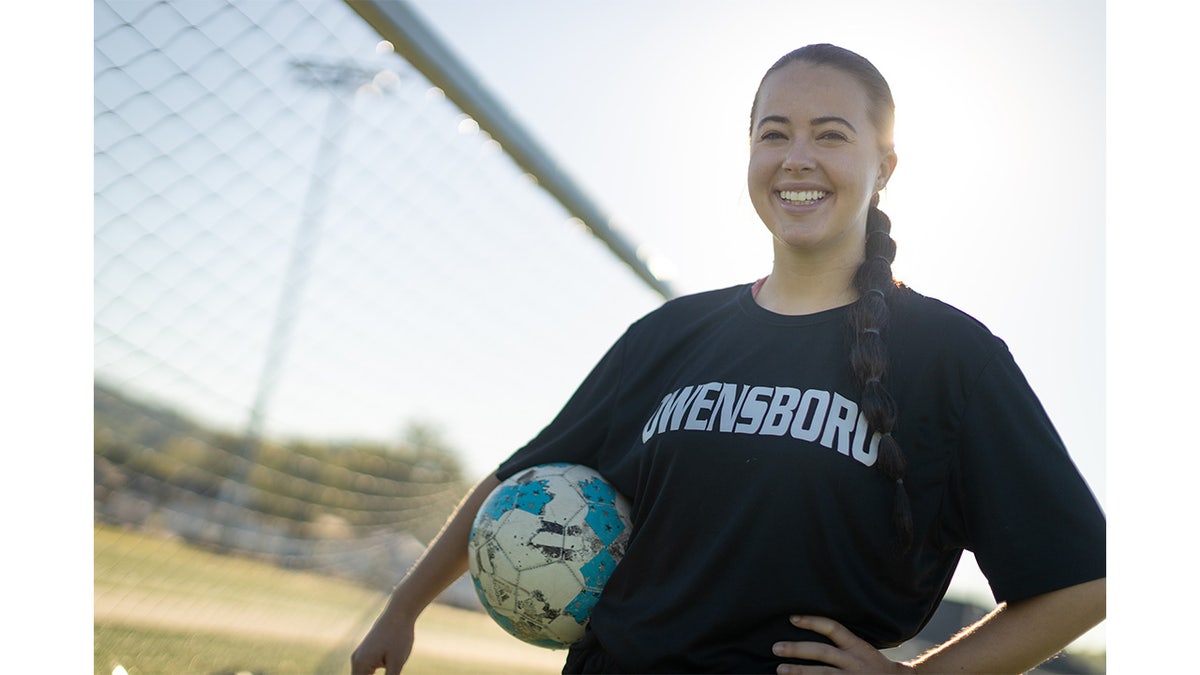Former collegiate women’s soccer player fighting for ‘fair and safe playing field’
Former W.Va. State University soccer player Lainey Armistead and Alliance Defending Freedom’s Matt Sharp discuss their efforts to defend women’s sports.
Earlier this month, TIME magazine named U.S. women’s soccer star Megan Rapinoe a 2023 "Woman of the Year." Rapinoe certainly invites controversy, but I admire her amazing skills and share her love of the "beautiful game."
This beautiful game was like the air I breathed growing up. I first kicked a soccer ball at age 3, and soon enough I was playing pick-up soccer games with my brothers. By the end of high school, I’d made it to state championships twice and dreamed of playing in college. A soccer scholarship from West Virginia State University made that possible.
While I was playing at WVSU, I started hearing stories about male athletes competing in female sports. Elite high school track athletes in Connecticut were losing out on dozens of opportunities to compete and medal because their state athletic association had changed the rules, allowing boys to compete on girls’ teams if they identified as female. I discovered the trend wasn’t limited to high school or Connecticut. I was appalled to see females sidelined in their own sport and impressed by their courageous fight for fairness.
POLITICO'S BANNED WORD LIST REVEALED: SHOWS OUTLET URGED WRITERS TO AVOID TERMS ‘MANKIND’, ‘BIOLOGICAL MALE'
Then I heard about a new West Virginia law, the "Save Women’s Sports" law (HB 3293), and I enthusiastically supported it. When I learned the law was being challenged in court, I made the tough decision to get off the sidelines and defend women’s athletics by joining the lawsuit.

Former college women’s soccer team captain Lainey Armistead observed how her teammates suffered from concussions, knee and ankle injuries just from competing against other women. (Alliance Defending Freedom)
I’m disappointed that protecting women’s sports is considered controversial. I’ve played plenty of friendly pickup soccer with guys. Here’s the simple truth: Most males are stronger, faster, and bigger than females. They run faster, kick the ball harder, and foul with more force. As WVSU women’s soccer team captain, I observed that my teammates suffered from concussions, knee, and ankle injuries. These injuries are common in soccer, but they’re risks we agreed to take when we competed against other women.
CLICK HERE TO GET THE OPINION NEWSLETTER
Allowing males to compete in our sport would be devastating to our game, our morale and our safety. That’s why I was relieved when a district court upheld that basic principle in January. After taking seven months to review the facts (totaling over 3,000 pages of testimony and expert reports), the court upheld West Virginia’ law and affirmed common sense: "While some females may be able to outperform some males, it is generally accepted that, on average, males outperform females athletically because of inherent physical differences between the sexes."
I was then shocked to learn that the 4th Circuit, just last month, reversed the lower court’s ruling after looking at the facts and arguments for just five days — undoing in a few days what took the lower court months to do. And the 4th Circuit provided absolutely no rationale — legal or otherwise — for doing so.
So, with the help of my attorneys at Alliance Defending Freedom and alongside the West Virginia attorney general, I’m appealing this decision to the U.S. Supreme Court and asking it to allow West Virginia’s law to go back into effect. The law simply acknowledges that biological differences between males and females matter in athletics. It’s a commonsense position that’s consistent with the U.S. Constitution, Title IX, and reality.
As WVSU women’s soccer team captain, I observed that my teammates suffered from concussions, knee, and ankle injuries. These injuries are common in soccer, but they’re risks we agreed to take when we competed against other women.
CLICK HERE TO GET THE FOX NEWS APP
I believe that protecting fairness in women’s sports is a women’s rights issue. This isn’t just about my former teammates staying safe, though that obviously matters to me. It’s about protecting fairness and safety for all female athletes across West Virginia. And if someday I have a daughter, I want to make sure that she and her peers aren’t discriminated against but have access to the same equal athletic opportunities that shaped my life.
When asked about playing in this summer’s World Cup, Rapinoe said, "I want our team to feel confident and swaggy and be exactly who we are." She continued, "But ultimately, I want to win." I feel the same way, and I bet other female athletes in West Virginia do, too. Girls and women deserve this opportunity — to compete on a fair playing field and to gain the chance to be champions. Upholding West Virginia’s law gives us the ability to do so.

